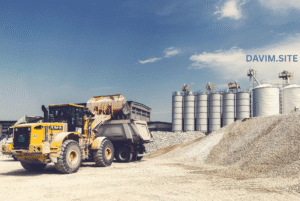Globally, the industries, including building, are flourishing. The need for qualified heavy equipment operators has never been greater as major projects and infrastructure development expand. A vacancy for a heavy equipment operator is more than simply a job; it’s a portal to a solid, well-paying career with plenty of possibility for development.
We investigate in this post what a heavy equipment operator performs, the credentials needed, present employment market trends, and how to secure the finest jobs in this exciting industry.
What Is a Heavy Equipment Operator?
A heavy equipment operator is a trained professional who operates machinery used in construction, mining, logging, and other industries. This includes:
-
Excavators
-
Bulldozers
-
Backhoes
-
Cranes
-
Loaders
-
Graders
-
Forklifts
These machines are essential for earthmoving, lifting, and transporting materials at job sites. Operators must be highly skilled, safety-conscious, and able to perform under pressure.
Why Is There a Surge in Heavy Equipment Operator Vacancies?
Several factors contribute to the increasing number of heavy equipment operator job openings:
-
Aging Workforce: Many current operators are nearing retirement age, creating a wave of new vacancies.
-
Infrastructure Projects: Governments worldwide are investing heavily in infrastructure—roads, bridges, airports, and housing.
-
Growth in Construction Industry: With urban expansion and population growth, construction companies are constantly on the lookout for skilled machine operators.
-
Oil, Gas, and Mining Boom: These industries require large-scale machinery and operators who can manage them efficiently.
Qualifications and Skills Required for a Heavy Equipment Operator Vacancy
While some employers may offer on-the-job training, most prefer candidates with formal education or certification. Here’s what you need to qualify:
1. Education and Certification
-
High school diploma or equivalent
-
Certificate or diploma in heavy equipment operation from a vocational school
-
Certification from organizations like the National Commission for the Certification of Crane Operators (NCCCO) or OSHA
2. Skills and Attributes
-
Mechanical aptitude
-
Good hand-eye coordination
-
Physical strength and stamina
-
Understanding of safety protocols
-
Basic math and reading comprehension
3. Licenses
In many cases, operators may need a Commercial Driver’s License (CDL) to transport equipment to different job sites.
Types of Heavy Equipment Operator Jobs
Depending on the industry and the type of machinery, there are various roles available:
Construction Equipment Operator
Often found on residential or commercial building sites. Responsible for grading land, digging foundations, and clearing debris.
Crane Operator
Specialized role requiring certification. Often employed in high-rise construction, docks, or shipyards.
Excavator Operator
Common in mining, roadworks, and trenching projects. Excavator operators need precision and a good understanding of soil types.
Loader/Backhoe Operator
These professionals are crucial in both construction and agriculture for moving material like soil, gravel, and debris.
Where to Find Heavy Equipment Operator Vacancies
Looking for a vacant position as a heavy equipment operator? Here are the best places to start your search:
1. Job Portals
-
Indeed
-
ZipRecruiter
-
Glassdoor
-
Monster
-
CareerBuilder
2. Company Websites
Construction giants like Caterpillar, Komatsu, Bechtel, and Fluor frequently post job openings on their career pages.
3. Union Listings
Local unions often have listings for job opportunities and apprenticeships.
4. Government and Municipal Jobs
Cities, states, and federal agencies often hire equipment operators for public works projects.
Top Cities and Regions Hiring Heavy Equipment Operators
Some regions are particularly active in hiring due to economic development and ongoing construction projects:
-
Texas – Known for oil, gas, and real estate expansion
-
California – Urban development and infrastructure
-
Florida – Coastal development and hurricane recovery work
-
New York and New Jersey – Large-scale construction and transportation projects
-
Alberta and British Columbia, Canada – Oil sands and logging
What Does a Heavy Equipment Operator Earn?
The salary can vary depending on location, experience, and the type of equipment operated.
United States:
-
Entry-level: $18–$25 per hour
-
Experienced operators: $30–$45 per hour
-
Specialized roles (e.g., crane operators): $60,000–$90,000+ annually
Canada:
-
$25–$50 per hour, with higher wages in remote or Northern regions
Additional Benefits May Include:
-
Overtime pay
-
Union benefits
-
Health insurance
-
Retirement plans
-
Travel allowances for remote work
Tips to Land a Heavy Equipment Operator Job
If you’re targeting a heavy equipment operator vacancy, use the following strategies to stand out from the competition:
1. Get Certified
This adds credibility and shows you’re serious about your career.
2. Build a Strong Resume
Highlight:
-
Equipment you’re certified to operate
-
Years of experience
-
Project types you’ve worked on (residential, commercial, government)
-
Safety record
3. Network
Join construction trade shows, industry meetups, and forums. A good word from a contact often helps more than a cold application.
4. Start Small
Don’t overlook apprenticeships and entry-level positions—they can lead to full-time jobs with better pay.
5. Stay Current
Take refresher courses and keep up with changes in equipment and safety standards.
Challenges in the Field
While the job has many rewards, it also comes with challenges:
-
Long Hours: Many projects require night shifts, weekend work, or 12-hour days.
-
Weather Dependency: Outdoor work may stop due to rain, snow, or extreme heat.
-
Physical Demands: Requires endurance and alertness, especially on large or dangerous sites.
-
Job Site Hazards: Safety is crucial, and even a small error can lead to major accidents.
Future of Heavy Equipment Operation Jobs
The future appears promising for qualified operators. While GPS-driven technology and automation are altering the field, human operators are still required to oversee, debug, and regulate machinery.
Many businesses are now providing smart equipment training, therefore giving tech-savvy people chances to lead the next generation of mining and construction experts.

Conclusion
More than simply a job, a vacancy for a heavy equipment operator offers—a career opportunity with great compensation, strong benefits, and possibility for promotion. Whether you have years of experience or are just starting out, the present demand makes now the ideal moment to seek a job in this highly sought-after industry.
Maintaining your certification, maintain networking, and always give safety first priority can help you to go towards a successful and rewarding profession.
Meta Description (SEO)
Looking for a heavy equipment operator vacancy? Discover job opportunities, salary expectations, certifications needed, and how to land a rewarding role in this high-demand field.
Ad Copy Ideas
Ad #1 (Search Ad)
Title: Hiring Heavy Equipment Operators Now
Description: Top pay, great benefits, and steady work. Apply now for open heavy equipment operator positions in your area.
Ad #2 (Social Ad)
Want to Operate Big Machines?
Start a high-paying career as a heavy equipment operator. No degree required. Apply today and get trained by the best!
